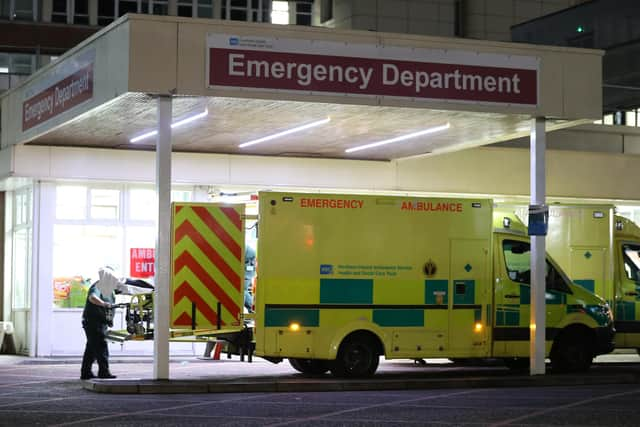Crisis at Northern Ireland A&Es could cause 'more harm than Covid', leading medic warns


This comes amid widespread pressures across emergency departments in several hospitals throughout Northern Ireland, and follows a warning from a senior consultant in the News Letter earlier this week that medics could struggle to free up “capacity” to treat multiple casualties in the event of a “true catastrophe” such as a bus crash.
Antrim Area Hospital declared a major incident at its emergency department on Saturday night, closing the doors to patients due to unsafe conditions as it became overwhelmed with the numbers seeking emergency medical care.
Advertisement
Hide AdAdvertisement
Hide AdThe following day the Belfast Health Trust appealed for available nursing staff to go to hospitals to help alleviate pressures.
On Monday, the Ulster Hospital in Dundonald reported that it was under "severe pressure" and on Tuesday Craigavon Area Hospital was the latest to appeal for support in freeing up beds.
It was described as operating under extreme pressure, with 138 patients waiting in emergency department (ED) and ambulances queued outside.
On Monday, the BBC reported that a 77-year-old woman who had spent several hours waiting on a trolly in the Royal Victoria Hospital had died.
Advertisement
Hide AdAdvertisement
Hide AdThe families of two women who waited all night in ambulances outside hospitals - one in Coleraine in Co Londonderry and another in Antrim - before being admitted have also described to the broascaster about the distress it caused.
The BBC reported that Colleen O'Neill's grandmother Mary, who has dementia, waited more than 10 hours outside Causeway Hospital in Coleraine.
Tracey McCausland's mother Patricia, meanwhile, was outside Antrim Area Hospital with a fractured kneecap for eight hours.
On Wednesday, the clinical director of emergency medicine at the Southern Health and Social Care Trust, said the ongoing crisis has "the potential to cause more harm than even Covid."
Advertisement
Hide AdAdvertisement
Hide AdSpeaking to BBC Radio Ulster, Dr Hampton explained: "You have to consider how many patients attend emergency departments, and how much harm we know can come from an ambulance being delayed or how much harm can come from a delay in coming to patients.
"For example, we treat severe infections, heart attacks, strokes, and we know in our current situation that there is increased time until we give those patients treatment.
“Someone may not die in an emergency department, but if you take all of the people in Northern Ireland who are treated for sepsis in one year and they all receive care which isn't as good as it should be, well, then unfortunately we will see excessive deaths.”
He continued: “That's my understanding. We know, we have studied, if our ambulances are delayed, if people are in emergency departments for eight or 12 hours, we start to see people come to harm and unfortunately we start to see people die in the longer term.”
Advertisement
Hide AdAdvertisement
Hide AdHe called for a similar approach to that adopted during the pandemic to tackle the problem, saying: “We need to act in the same way, the same collegiate working together and not stop until we get a better outcome for our patients.”